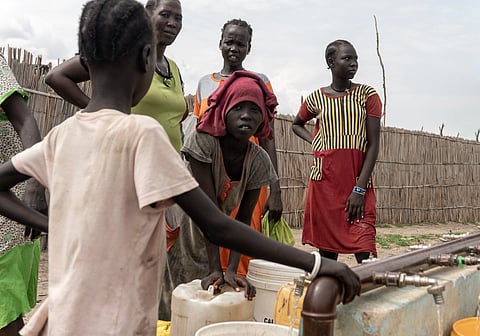

Nearly 11 million women and girls in Sudan are now acutely food insecure, UN Women’s new report reveals.
The Gender Dimensions of Food Insecurity in Sudan alert links extreme hunger to gender-based vulnerability.
Famine has been declared in El Fasher and Kadugli, amid escalating conflict and displacement.
Women and girls are skipping meals, foraging for survival, and facing increased risks of sexual violence.
UN Women calls for an immediate halt to violence and greater support for women-led humanitarian efforts.
Nearly 11 million women and girls in Sudan are now acutely food insecure, according to a new gender alert released by UN Women on Wednesday, which warns that simply being a woman in Sudan has become a “strong predictor of hunger”.
The report, Gender Dimensions of Food Insecurity in Sudan, was launched November 11, 2025 from the Palais des Nations in Geneva by Anna Mutavati, UN Women’s Regional Director for East and Southern Africa, who called for urgent protection and prioritisation of women and girls amid Sudan’s worsening humanitarian catastrophe.
“For over two consecutive years, every front line in Sudan has cut through the bodies, homes, livelihoods, and futures of women and girls,” Mutavati said. “They have endured the sharpest edge of Sudan’s horrific conflict.”
The alert comes as famine has been officially declared by the Integrated Food Security Phase Classification (IPC) in El Fasher and Kadugli as of November 2025, and as extreme hunger and violence continue to spread across Darfur and other regions.
Over 73 per cent of women in Sudan do not meet minimum dietary diversity standards, indicating extremely poor diets and heightened malnutrition risks, the report found. In many communities, women and girls are eating the least—or not at all.
Field interviews cited in the report show that women often skip meals to feed their children, while adolescent girls receive the smallest portions, undermining their health and long-term nutrition. In besieged or remote areas such as Darfur and Kordofan, women and girls are scavenging for wild leaves and berries to survive, exposing them to further risks of abduction, sexual violence, and assault.
Women interviewed from El Fasher described enduring starvation, displacement, rape, and bombardment. With the last remaining maternity hospital looted and destroyed, some pregnant women have been forced to give birth in the streets. Those fleeing the city report witnessing killings, sexual violence, and the disappearance of children, with almost no access to mental health or psychosocial support across affected areas.
Despite the dire conditions, UN Women emphasised that women-led organisations remain the “bedrock” of the humanitarian response, sustaining relief efforts on the ground.
The agency called for an immediate halt to all violence in Sudan and the full implementation of the proposed humanitarian ceasefire. It urged all parties to ensure safe corridors for women, girls, and civilians, and for humanitarian actors to prioritise women-headed households in food assistance and livelihood restoration.